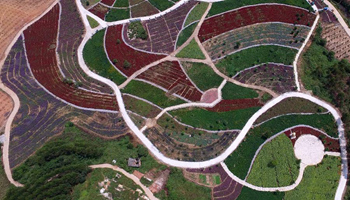URUMQI, Sept. 26 (Xinhua) -- A documentary broadcast Monday traces the origins of the humble apple to northwestern Xinjiang, quashing the popularly-held Chinese belief that they were introduced to the country from the West.
The documentary, "Saving the gene pool," draws on a multitude of scientific evidence to prove that all cultivated apple varieties are off-shoots of Malus sieversii, a wild apple native to Mount Tianshan in Central Asia.
Many Chinese attribute the introduction of the apple to China by John Livingstone Nevius, an American Christian missionary. Livingstone and his wife were said to have brought apple seedings with them to Yantai, in Shandong Province, which is now a major apple growing region.
The documentary team also tested a wild apple tree in Kazak Autonomous Prefecture of Ili in Xinjiang Uygur Autonomous Region. The 12.9-meter tree is believed to be over 600 years old, predating the supposed introduction of apples to China by few hundred years.
The sequencing of the apple genome by Italian Riccardo Velasco further supports the relationship between wild apples and the domesticated apple, said Zhang Daoyuan, researcher from Xinjiang Institute of Ecology and Geography under the Chinese Academy of Sciences (CAS).
Mount Tianshan has one of the world's largest wild fruit ecological systems. Many wild fruit species flourished in the valleys and basins of Mount Tianshan during the ice age of the Cenozoic Era, around 65 million years ago. According to the latest research, the region has 84 varieties of wild apple, making it a rare and rich apple gene pool.
Guan Kaiyun, deputy head of the institute, said researchers are exploring the potential to domesticate wild varieties that are drought- and cold- resistant and good in flavor.
The documentary, broadcast by China Central Television (CCTV) science and education channel, was jointly produced by the institute, CCTV and CAS Bureau of Science Communication.










